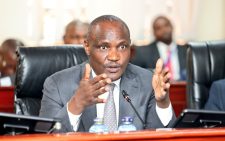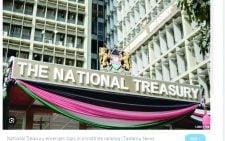Mbadi dismisses claims of possible debt default

National Treasury Cabinet Secretary John Mbadi says that Kenya will not face any external debt obligations between 2032 and 2048, attributing the current pressure on debt repayments to the fact that most loans are now reaching maturity.
He gave the assurance while responding to Kiharu MP Ndindi Nyoro’s warnings that the country risks defaulting due to mismanagement of its debt sustainability framework. Mbadi termed Nyoro’s claims as “irresponsible,” insisting that Kenya remains financially stable and is the strongest economy in the region.
“Yes, there were times when we had challenges but where we are, we don’t have a problem with debt sustainability. The problem we have is liquidity with most loans maturing between now and 2032 and that is why we have the pressure,” he said.
He backed his position with recent data showing an improved credit rating and reiterated that the International Monetary Fund (IMF) and the World Bank have validated the country’s debt sustainability.
According to him, the issue lies not in the debt itself but in liquidity, as the bulk of loan obligations are concentrated between now and 2032.
Mbadi said there will be no bilateral, multilateral, or commercial debt repayments required during the 2032–2048 window, urging various arms of government to collaborate in easing the current financial strain.
However, his strong assurance raised eyebrows. In an earlier interview, the CS had acknowledged that no country is completely debt-free.
Revenue shortfalls
“There is no country in the world which doesn’t borrow, we all have to borrow, but what you must do is to consistently manage your deficit as a percentage of gross domestic product,” he said during an interview in February.
Revenue shortfalls, growing budget deficits, and high expenditure levels all indicate that the Kenya Kwanza administration is likely to turn to both domestic and international credit markets to fund its operations. This undermines Mbadi’s claim of a debt-free future and calls for clearer communication to the increasingly informed public.
Ndindi Nyoro, during the launch of the Institute of Public Finance’s Annual Budget Shadow Report, doubled down on his concerns, arguing that excessive borrowing and the use of expensive loans are pushing Kenya closer to debt distress.
“And I don’t think we are taking the seriousness of this matter the way it should. And I also don’t think those who are responsible are communicating enough about the problem we have on our hands,” he said, noting that in terms of debt management, Kenya has a lot of work to do as a country.
He criticised the executive’s borrowing strategy as inefficient and unsustainable, with interest payments alone consuming more than Sh1.8 trillion annually. Of this, Sh750 billion goes toward domestic debt and Sh250 billion to external obligations.
Troubling trend
He cited last year’s issuance of a high-interest bond to repay a maturing lower-interest one as a troubling trend, warning that such moves only compound the country’s financial woes.
Nyoro emphasised that nearly 40 per cent of total revenue now goes toward debt repayment, significantly limiting development financing. He added that after accounting for debt servicing, salaries, and the Consolidated Fund Services, the government is already operating in the red.
The Kiharu MP noted that Kenya is borrowing not just for development, but also to repay existing debts—a practice that only deepens fiscal vulnerability.
He further questioned Mbadi’s recent visit to China, suggesting that the talks centred on debt and that such diplomatic moves could send worrying signals to the global credit markets.
As the country grapples with widening deficits and sluggish revenue growth, both voices highlight the urgent need for transparency, prudent fiscal planning, and more disciplined spending to avoid a looming debt crisis.
According to Nyoro, 40 per cent of the total revenue collection, goes to debt repayment leaving a narrowed room for the country to focus on development projects as.
In spite of the harsh reality, the country still records revenue collection shortfalls amid high expenditures. He faulted that government for failing to match with the revenue consolidation realities instead going heavy on expenditures.
“You collect revenues of about Sh2.4 trillion. You use over Sh1.2 trillion in paying interest rates of debt in kind. So that’s 50 per cent that you can do nothing about. If we take our revenue collection, you remove CFS, you remove salaries, you are already in red,” Nyoro noted.
This according to him means that the money Kenya borrows, part of it is for budget support, which is evidently channelled for retirement of debts hence calling for prudent measures to cushion the country from falling into debt distress.
Credit market
Nyoro further noted that discussions during the visit by Mbadi to China was primarily revolving around debt, a move which sends a wrong signal to the credit market.
“Because we are almost at a cliff in terms of debt regime, and especially interest rate, the problem is that when you go to your creditors to discuss either scheduling debt or working around new terms, what are you telling the market?” he said.












